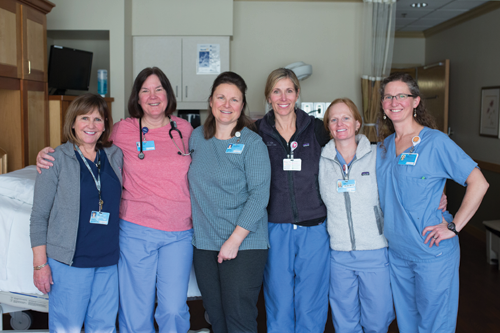News
Perinatal Services Through The Years

It's been a long and fascinating journey for Amy Lavigne, the manager of perinatal services at VVMC. She started as an acute care nurse in the Detroit suburbs before moving to Colorado in 1999. Once here, she hardly looked back.
"We didn't think of anywhere but the Vail Valley," Amy says. Now celebrating her 17th year at the hospital, Amy looks back at her early days on the Patient Care Unit to the last 16 years in the Women & Children's Center, where she worked her way from a staff nurse to charge nurse to clinical educator and now manager.
"I'd always had a passion for perinatal nursing," Amy says. "This is truly individualized care here: What does each person, each mom, each family want for their experience? That's what we strive for, and our patients are very happy with what we provide. They feel like they have a voice in their care, and that's very near and dear to our hearts here."
Amy now oversees about 30 staff members in labor and delivery, post-partum care, the Level II Nursery - the only one of its kind between Vail and Denver - and services for prenatal patients with complications or other concerns. The journey has been long for this career nurse, but each and every childbirth reminds her why she fell in love with her unit.
"After 16.5 years, I never get over watching a couple come in, just the two of them, and then leave with a third person, with their baby," Amy says. "To be a witness to that shift is incredible. Their life has been completely altered. It's a lot of responsibility on their part and a lot of responsibility on our part to help them be as successful as they can be."
It truly is about the people for Amy. When she arrived, the hospital had about 200 births per year, and in 2007 it had nearly 720. These days, Amy and her staff help welcome about 470 Vail babies per year. She's proud of her department's continuity of care: At a larger hospital, new moms might see doctors and nurses and other specialists in several different departments - or buildings. Here, in Amy's unit, it's a second home.
"Because we're smaller we're able to focus on the entire family, whatever that means for the individual patient," Amy says. "We take care of our dads exactly the same as our moms. We can give that level of individualized care. There's a sense of taking care of each other as a staff and a community, and that has a really amazing feeling to it."
More News
-
New!
More

The Heart of It All: How Cardiovascular Health Shapes Longevity
Most of us know a healthy heart will increase our chances for a long and vital life, but how many of us truly understand how to live for a healthy heart? According to the American Heart Association, heart disease remains the number one cause of death, for both men and women, in the United States.
-
New!
More

GLP-1s and Your Health Journey: What You Need to Know
Interest in GLP-1 agonist medications, once used almost exclusively for diabetes, is soaring. Now widely referred to as weight loss injections, drugs like semaglutide (Ozempic, Wegovy) and tirzepatide (Mounjaro, Zepbound) are ubiquitous in celebrity chatter, social media and everyday patient conversations. But as demand grows, it’s increasingly important to separate hype from reality. Who qualifies for these drugs under FDA guidelines? When are they helpful? And when might carefully supported lifestyle changes offer a safer or more sustainable path?
-
New!
More

Back on the Slopes: How to Recover Physically and Mentally After a Ski or Snowboard Injury
Living in a ski town, injury is inevitable. Recovery isn’t just about regaining strength, it’s about building trust in your body. The best path back to skiing blends physical training with mental conditioning, patience with persistence. With the expert teams at Vail Health - from Howard Head Sports Medicine to Vail Health Behavioral Health - recovery is more than healing; it’s coming back stronger, smarter and more confident than before.





